This workshop will form part of a series of meetings of the ‘Society for the Study of Bio-political Futures’ (SSBF) established by Gregg Lambert and Cary Wolfe at Syracuse University in 2013: http://www.biopoliticalfutures.net/
Events
In this section you'll find a collection of events related to biopolitics around the world.
Engaging Foucault
The conference “Engaging Foucault” will gather international and regional theorists who have engaged with Foucault’s work, either endorsing or disputing the main premises of his work. The intended aim of the conference is to open up space for a general discussion of the actuality of Foucault’s work.
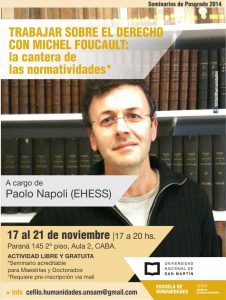
Seminar “Trabajar sobre el derecho con M Foucault: la cantera de normatividades”
Seminar “Trabajar sobre el derecho con M Foucault: la cantera de normatividades”, by Paolo Napoli. School of Humanities, Universidad Nacional de San Martín, Argentina.
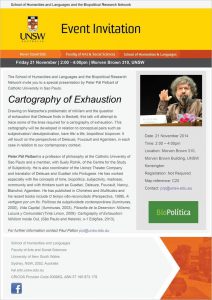
Cartography of Exhaustion
Conference on Biopolitics “Cartography of Exhaustion” by Peter Pál Pelbart, School of Humanities and Languages and the Biopolitical Research Network.
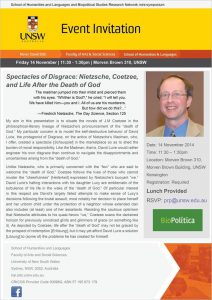
Spectacles of Disgrace: Nietzsche, Coetzee and Life After the Death of God
School of Humanities and Languages and Biopolitical Studies Research Network mini-symposium “Spectacles of Disgrace: Nietzsche, Coetzee and Life After the Death of God”. Daniel Conway, Department of Philosophy and Humanities Texas A&M University
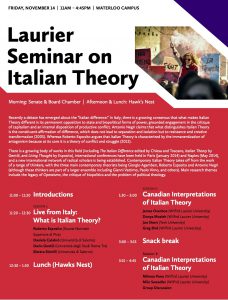
Laurier Seminar on Italian Theory
Recently a debate has emerged about the “Italian difference.” In Italy, there is a growing consensus that what makes Italian Theory different is its permanent opposition to state and biopolitical forms of power, grounded engagement in the critique of capitalism and an internal disposition of productive conflict. Antonio Negri claims that what distinguishes Italian Theory is the constituent affirmation of difference, which does not lead to separation and isolation but to resistance and creative transformation (2005). Whereas Roberto Esposito argues that Italian Theory is characterized by the immanentization of antagonism because at its core it is a theory of conflict and struggle (2012).
International Conference “Actuality and uses of philosophy of Michel Foucault”
International conference “Actuality and uses of the philosophy of Michel Foucault”, will be at Teatro Tornavías, november 10-12, Universidad Nacional de San Martín, Argentine.
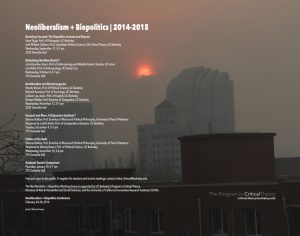
Neoliberalism + Biopolitics Conference
Neoliberalism + Biopolitics Conference is the final international event of semester-long series named Neoliberalism + Biopolitics Working Group which is investigating the role of neoliberalism and biopolitics as both contemporary objects of study and paradigms of analysis for humanistic and social- scientific inquiry. While the two concepts were originally linked at both the historical and conceptual level by Michel Foucault’s 1978-79 Collège de France lectures, their contemporary usage extends far beyond this earlier articulation. Today, neoliberalism and biopolitics are increasingly deployed as conceptual tools to describe and evaluate new forms of political power, social control, technological developments, and economic orders. The proliferation of these terms, however, has also placed their enduring diagnostic value in doubt. This working group thus hopes to call these terms into question, refine their analytical precision, and test their explanatory potential against empirical investigations of contemporary social, political, and economic life. In particular, it hopes to interrogate the ways in which neoliberalism may function as a form of “biopolitics”—that is, the ways in which neoliberalism may develop and deploy new techniques of governance for the regulation and transformation of human life.
Sessions begin 17 september and are open to Critical Theory students and faculty, and other campus and public audiences. Meetings feature conversations on assigned readings and presentations by guest speakers including Étienne Balibar (University of Paris), Julia Elyachar (UC Irvine), and Lisa Rofel (UC Santa Cruz). The series culminates in a conference on February 26-28, 2015 that brings major scholars from diverse fields to discuss new research on these topics.
For more information about the conference and sessions of the Working Group, see http://criticaltheory.berkeley.edu/
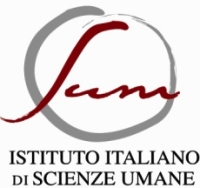
Italian Theory Categorie e problemi della filosofia italiana contemporanea
International Conference: Italian Theory. Categories and problems of contemporary italian philosophy
Instituto Italiano di Scienze Umane; Scuola Normale Superiore; Instituto Italiano per gli Studi Filosofici
May 15th, 16th and 17th, 2014
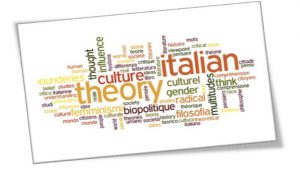
L’Italian theory existe-t-elle ? / Does Italian Theory Exist?
International Conference: Does Italian Theory Exist?
Université Paris Ouest Nanterre La Défense and Université Paris-Sorbonne
Paris, Jan. 24th – 25th, 2014
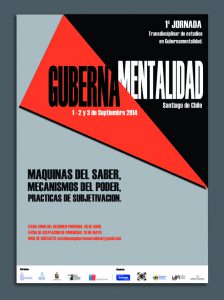
Gubernamentalidad. Primera Jornada Transdisciplinar de Estudios en Gubernamentalidad
Gubernamentalidad. Primera Jornada de Estudios Transdisciplinar de Estudios en Gubernamentalidad.
Maquinas del saber, mecanismos del poder, practicas de subjetivacion.
Life, in Theory. The 8th Meeting of the European Society for Literature, Science, and the Arts
In the past forty years, research in genetics and genomics, the convergence of the latter with digital technology, and the intrusion of technology into all forms of life have called into question the idea that life is anything simple, natural or biological, and have made available knowledge and resources that may determine mutations or new […]
Citizenship, Orientalism and the Commons
The event takes theatre to be a laboratory for the performances of critical political imaginaries on citizenship. Its conceptual core is a dialogue and translation between art, politics, and economics with a critical reflection on acts and practices of public engagement, common property, debt, and co-work. Bringing together scholars, artists and activists the event xplores participatory forms of knowledge production, livelihood, civic action and resistance in and outside Europe through collective rehearsals, discussions and staged film performances. The Teatro Valle Occupato becomes our stage in which such political, ethical and aesthetic experiments are tested and played out.
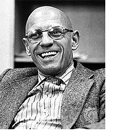
“DANGEROUS IDEAS: Rethinking the Politics of Critique Foucault in Tunisia Today: Revolution and the problem of telling the truth about a (true) event”.
Conference by Dr Patrice Maniglier, University of Essex.
Colloquium: Bernard Gendron, “Foucault’s 1968”
Foucault Society invites to the Colloquium Series on Thursday, Feb 16, with “Foucault’s 1968,” a talk by Bernard Gendron, Professor Emeritus of Philosophy at the University of Wisconsin, Milwaukee. Gendron argues that Foucault’s turn to political militancy within a post-1968 horizon was the chief catalyst for redirecting his theoretical work in the years, 1969-1974, leading to the publication of Discipline and Punish.

Reading Group: The Courage of Truth
Foucault Society.org invites to join on Feb 8 for the first meeting of our intensive, semester-long reading group on Foucault’s final lecture course, The Courage of Truth. We will discuss the lecture, 1 February 1984, First and Second Hours. To register, email Kevin Jobe at:foucaultsocietyorg@gmail.com

MANAGING LIFE
Conference and Exhibition
25th of May / 05th of October / 07th of December
Belgrade 2012
* 25th of May 2012
Biopolitics Today
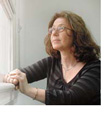
Séminaire Foucault – Université Paris 1 Pantheón-Sorbonne
EA 3562 PHILOSOPHIES CONTEMPORAINES/ EXeCO. Animé par Jean-François Braunstein.
The Foucault Society Reading Group: June Meetings
Foucault Society.org invites to join on june for the meetings of our intensive, semester-long reading group on Foucault’s final lecture course, The Courage of Truth.
Colloque Michel Foucault: “From the Gouvernement des vivants to the Courage de la vérité”
Résumé: Ce colloque, consacré à l’œuvre de Michel Foucault, se propose en particulier de relever le défi posé par l’accumulation de connaissances nouvelles à propos du parcours foucaldien des années quatre-vingt.
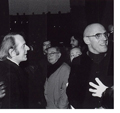
Conference: “Between Deleuze and Foucault”
Purdue University, College of Liberal Arts
November 30 – December 1, 2012
An international conference exploring the relations between the work of Gilles Deleuze (1925-1995) and Michel Foucault (1926-1984).

Grupo de Estudios en Biopolítica
El Grupo de Estudios en Biopolítica consiste en una sesión mensual donde profesores, doctorandos y estudiantes de Magíster presentan brevemente un trabajo en progreso enviado con una semana de antelación a los asistentes. La idea es recibir aportes a las distintas lecturas y abrir el debate entre los estudiantes y académicos.
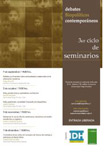
Tercer Ciclo de Debates Contemporáneos
La Red de Biopolítica, junto al Instituto de Humanidades de la Universidad Diego Portales, invitan a usted al “Tercer ciclo de Debates Biopolíticos contemporáneos”. Tras las dos experiencias anteriores, esta vez se busca problematizar y debatir en torno a los temas biopolítica y soberanía, la concepción de vida y sus implicancias en la biopolítica, así como las lecturas económicas sobre el gobierno de la vida. El ciclo contará con la presencia de destacados académicos e integrantes de nuestra Red que abrirán la discusión en 4 jornadas distintas. El formato es tipo seminario, por lo que se podrá acceder al manuscrito con una semana de anticipación por medio de nuestra web

IV Latin American Conference on Biopolitics, II International Conference on Biopolitics and Education
In the early 20th century the Sweden Rudolf Kjellén introduced the concept of biopolitics. Several decades later, without any reference to the work of Kjellén, Michel Foucault made use of this term to describe one of the fundamental dimensions of modern politics: the government of the biological life of the population. From 1974 to 1979, […]

IV Coloquio Latinoamericano de Biopolitica

Sexta Escuela Chile-Francia: Cátedra Michel Foucault
unes 28, Martes 29 y Miércoles 30 de Mayo de 2012
Horarios de las ponencias : Entre 9:30 y las 17:30 hrs.
Lugar: Teatro Antonio Varas de la Universidad de Chile, Morandé 25.
Actividad Gratuita.
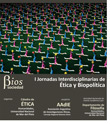
Bios y Sociedad. I Jornadas Interdisciplinarias de Ética y Biopolítica
Las I Jornadas Interdisciplinarias de Ética y Biopolítica buscan promover un espacio de encuentro entre el saber filosófico, el conocimiento científico y los saberes sociales desarrollados en el ámbito de la sociedad civil. Es por ello que buscan ser también un punto de intersección entre el discurso
Convocatoria Conversaciones en Estado de Excepción: Despliegue de los dispositivos de captura y encierro
El Programa de Estudios en Biopolíticas Educacionales del Departamento de Filosofía de la UMCE, junto al Grupo de Investigación en Educación y Poder,
Seminario de doctorado ““La comunidad en el discurso filosófico-político contemporáneo: las ontologías (im) políticas de lo común en Agamben, Nancy y Espósito”
Título: “La comunidad en el discurso filosófico-político contemporáneo: las ontologías (im)políticas de lo común de Agamben, Nancy y Esposito”
Profesor: Dr. Matías L. Saidel
Área: Filosofía / Teoría política.
Fechas: Jueves de Agosto, Septiembre y Primer Jueves de Octubre de 2012, de 14 a 17hs.
Seminario en línea “La potencia de la filosofía. Introducción al pensamiento de Giorgio Agamben”
El pensamiento de Giorgio Agamben plantea una serie de temas que se repiten de distintas maneras a lo largo de su vastísima trayectoria intelectual: la relación entre el hombre como viviente y el lenguaje; el problema conexo de la antropogénesis; la relación ontológica entre potencia y acto y sus consecuencias políticas: la relación entre biopolítica y soberanía; la cuestión de la comunidad y las formas de poder contemporáneas; la teología política y el mesianismo; la forma-de-vida y el uso en el marco de una ética de las profanaciones. A pesar de que las interrogaciones suelen repetirse, Agamben no pretende desarrollar un sistema filosófico. Por ello, en el seminario exploraremos estos temas como una serie de círculos concéntricos que apuntan a la cuestión fundamental para su filosofía: la necesidad de reelaborar la ontología a partir de una reconsideración de la potencia y su relación con el acto.

